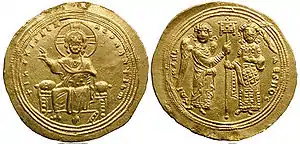1041
Year 1041 (MXLI) was a common year starting on Thursday (link will display the full calendar) of the Julian calendar.
| Millennium: | 2nd millennium |
|---|---|
| Centuries: | |
| Decades: | |
| Years: |
| 1041 by topic |
|---|
| Leaders |
|
| Birth and death categories |
| Births – Deaths |
| Establishments and disestablishments categories |
| Establishments – Disestablishments |
| Gregorian calendar | 1041 MXLI |
| Ab urbe condita | 1794 |
| Armenian calendar | 490 ԹՎ ՆՂ |
| Assyrian calendar | 5791 |
| Balinese saka calendar | 962–963 |
| Bengali calendar | 448 |
| Berber calendar | 1991 |
| English Regnal year | N/A |
| Buddhist calendar | 1585 |
| Burmese calendar | 403 |
| Byzantine calendar | 6549–6550 |
| Chinese calendar | 庚辰年 (Metal Dragon) 3737 or 3677 — to — 辛巳年 (Metal Snake) 3738 or 3678 |
| Coptic calendar | 757–758 |
| Discordian calendar | 2207 |
| Ethiopian calendar | 1033–1034 |
| Hebrew calendar | 4801–4802 |
| Hindu calendars | |
| - Vikram Samvat | 1097–1098 |
| - Shaka Samvat | 962–963 |
| - Kali Yuga | 4141–4142 |
| Holocene calendar | 11041 |
| Igbo calendar | 41–42 |
| Iranian calendar | 419–420 |
| Islamic calendar | 432–433 |
| Japanese calendar | Chōkyū 2 (長久2年) |
| Javanese calendar | 944–945 |
| Julian calendar | 1041 MXLI |
| Korean calendar | 3374 |
| Minguo calendar | 871 before ROC 民前871年 |
| Nanakshahi calendar | −427 |
| Seleucid era | 1352/1353 AG |
| Thai solar calendar | 1583–1584 |
| Tibetan calendar | 阳金龙年 (male Iron-Dragon) 1167 or 786 or 14 — to — 阴金蛇年 (female Iron-Snake) 1168 or 787 or 15 |

Michael V Kalaphates (c. 1015–1042)
Events
Byzantine Empire
- December 10 – Emperor Michael IV (the Paphlagonian) dies after a 6-year reign. His wife, Empress Zoë, elevates (on advice by her lover John the Orphanotrophos) her adoptive son to the throne of the Byzantine Empire, as Michael V Kalaphates. Shortly after, Michael comes into conflict with his uncle John, and banishes him to a monastery.
Europe
- March 17 – Battle of Olivento: Norman troops and their Lombard allies, led by William I (Iron Arm), are victorious against the Byzantines at the feet of the Monte Vulture, near the River Olivento in Apulia.
- May 4 – Battle of Montemaggiore: Lombard-Norman rebel forces, led by William I, are again victorious, and defeat a Byzantine army (18,000 men) on a hill named Montemaggiore, near the River Ofanto.
- September 3 – Battle of Montepeloso: Lombard-Norman rebel forces, led by William I, defeat the Byzantines at Montepeloso. During the battle, Boioannes, governor of the Catepanate of Italy, is captured.
- Winter – Battle of Ostrovo: The Byzantines, with the help of the Varangian Guard, led by Harald Hardrada (future king of Norway), defeat the Bulgarian troops, near Lake Ostrovo in Greece.
England
- Edward the Confessor returns to England from exile in Normandy, to become the heir of his half-brother Harthacnut, as king of England. He reduces the navy from 60 to 32 ships, due to the tax burden.
- The city of Worcester rebels against the taxes of Harthacnut. Edward enlists the help of Earl Godwin of Wessex (to support him in the right to claim the English throne) and marries his daughter Edith.
Africa
Asia
- The number of enlisted soldiers in the Song Dynasty Chinese military reaches well over 1,250,000 troops, an increase since 1022, when there were a million soldiers (approximate date).
Deaths
- February 4 – Fujiwara no Kintō, Japanese poet (b. 966)
- December 10 – Michael IV, Byzantine emperor (b. 1010)
- Adolf II of Lotharingia, German nobleman (b. 1002)
- Akazome Emon, Japanese waka poet (approximate date)
- Eadwulf III, English ealdorman and High-Reeve
- Edmund of Durham (or Eadmund), English bishop
- Gangeyadeva, Indian ruler of the Kalachuri Dynasty
- Mac Beathaidh mac Ainmire, Irish poet and Chief Ollam
- Muhammad, sultan of the Ghaznavid Empire (b. 998)
- Muhammad ibn Rustam Dushmanziyar, Buyid emir
- Peter Delyan, Bulgarian rebel leader and ruler (tsar)
- Sampiro, Spanish bishop, politician and intellectual
- Tancred of Hauteville, Norman nobleman (b. 980)
- Vikramabahu (or Kassapa), king of Sri Lanka (b. 1017)
References
- Gilbert Meynier (2010). L'Algérie cœur du Maghreb classique. De l'ouverture islamo-arabe au repli (658-1518). Paris: La Découverte; p.50.
This article is issued from Wikipedia. The text is licensed under Creative Commons - Attribution - Sharealike. Additional terms may apply for the media files.